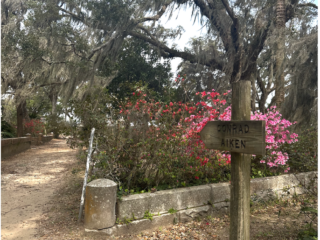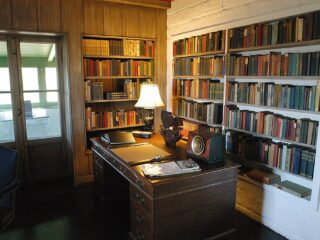by Paul Millward
In 1940, from deep beneath the buildings of Whitehall in London, in an underground complex known as the Cabinet War Rooms, Winston Churchill saved Britain. This secret cavern became the nerve centre of the war. Churchill would even sleep here on occasions. In Room 60 of this political bunker, he made his historic radio speeches to the nation, speeches which gave the people the strength and resolve to win the war.
I sometimes imagine my mother as a teenage girl at home, huddled around the radio with her brothers and sisters in 1940, anxiously listening to Churchill’s addresses. These were desperate times for Britain following the withdrawal at Dunkirk, when Hitler had consumed much of Western Europe and we stood alone against the might of Nazi power. It must have been with great fear and trepidation that they waited for his words. Every syllable he uttered would be devoured with intense concentration.
And what they heard were some of the greatest words spoken in history, words which even today as I read them, I am filled with resolve and determination to never give in to any of life’s difficulties. Churchill was in effect a poet in the guise of a politician. He used his ability to manipulate words into unforgettable speeches, thus instilling the listener with incredible fortitude. This particular speech transcends its political context and becomes a literary tour de force, which actually reads as if it were written in verse form:
Even though large tracts of Europe and many old and famous States have fallen or may fall into the grip of the Gestapo and all the odious apparatus of Nazi rule, we shall not flag or fail.
We shall go on to the end, we shall fight in France,
We shall fight on the seas and oceans,
We shall fight with growing confidence and growing strength in the air, we shall defend our
Island whatever the cost may be,
We shall fight on the beaches,
We shall fight on the landing grounds,
We shall fight in the fields and in the streets,
We shall fight in the hills;
We shall never surrender.
The speech takes on an inexorable rhythm, which coupled with the use of repetition, acquires a kind of imperial power reminiscent of Shakespeare. The extraordinary potency of these words transformed the nation. It filled everyone who heard it with faith and conviction, and it enabled our small island to withstand pure evil. It somehow reaches into the very soul of England and calls up that lion spirit which lies dormant within every English heart.
Here was the source of my mother’s indomitable spirit which shone strongly even in her last years. I vividly remember one Christmas, when at the age of 79 she fell from the top of her stairs all the way down to the bottom. Not only did she survive, battered and bruised as she was, but she was up and dressed Christmas morning, determined the day would not be ruined. I knew this amazing toughness had been moulded by the events of the Second World War, and along with all her generation, it had been shaped in steel by Churchill’s remarkable speeches.
Of course the war was not the first time Churchill had used his literary skills to good effect. Churchill worked as a journalist in his youth and also fought with the British Army in India and Sudan. As a journalist, he was taken captive in South Africa, where his reports from the Boar War first brought him to public attention. He became a prodigious writer of historical books, including The River War, written in 1899 while he was still a soldier, describing the war in the Sudan.
His appointment as Prime Minister ironically led to Churchill’s most important and effective literary efforts. After a mixed parliamentary career which see-sawed continually and was marked by controversial stances which earned him many political enemies, Churchill suddenly emerged from the shadows as the man of the moment. It soon became apparent that he was a genius at both writing and delivering speeches and his reputation as a great orator became established.
Many of his greatest speeches contain passages which acquire the quality of prose poetry and are full of phrases which inspired and galvanised the population of Britain at a crucial time. His first broadcast to the people was made on the 19th of May 1940, and it includes these words:
Behind us…..gather a group of shattered states and bludgeoned races……upon whom the long night of barbarism will descend, unbroken even by a star of hope, unless we conquer, as conquer we must; as conquer we shall.
Already we see the poetic techniques which were to become the defining feature of his greatest speeches. It employs colourful imagery, not normally part of the politician’s arsenal, and cleverly creates a rhythmic, powerful resonance with its repetition of the word conquer. It communicates unequivocally the absolute conviction that we will free Europe from tyranny.
The war had fascinated me from a small boy, and I loved to listen to my parents reeling off their war time stories: how we won The Battle of Britain, with seemingly just a handful of Spitfires, still remains a wonder to me. On the 14th of July 1940, on the eve of that great air battle, the BBC broadcast to the nation Churchill’s “War of the Unknown Warrior” speech, which includes this beautiful passage:
Faith is given to us to help and comfort us when we stand in awe before the unfurling scroll of human destiny.
The speech then expands into an almost lyrical reverie which gently evokes the heroic spirit of England and strikes at the core of our national identity, echoing the words of Shakespeare, who perhaps more than anyone forged this identity and gave voice to an English pride which would never allow our island to be conquered by foreign powers. Churchill channels the spirit of Shakespeare with these words:
And now it has come to us to stand alone in the breach, and face the worst that the tyrant’s might and enmity can do….here, girt about by the seas and the oceans where the Navy reins; shielded from above by the prowess and devotion of our airmen we await undismayed by the impending assault.
There are whispers of Henry V in these words, a play which interestingly was adapted into a film by Lawrence Olivier during the war, with the specific purpose of boosting the nation’s morale:
Once more unto the breech, dear friends, once more;
Or close the wall up with our English dead!
Churchill’s speeches tapped into the collective unconscious of the English. They re-awakened Shakespeare, who was deeply embedded within the nation’s psyche centuries before, with such immortal lines as these from Richard II:
This precious stone set in the silver sea,
This blessed spot, this earth, this realm, this England.
But it was only later in life as an adult, examining the historical reality of 1940, it became apparent to me that our defeat was inevitable. The only sensible course of action would have been to capitulate to Hitler and negotiate a peace deal. And yet my parents had never spoken about the war in this way. I remember asking my mother what was the source of this unquestioned belief that we would survive. Her answer was simple: Churchill’s speeches. His words somehow filled every person in the country with the absolute certainty that we would win.
However, during August 1940 The Battle of Britain reached a point of dire crisis. At this defining moment in history, the resources of the RAF (Royal Air Force) had all but been consumed and the most critical period of the war had to be endured, as the Germans focused their devastating attacks on the airfields of southern England. On the 20th of August, Churchill gave another vital speech which contains one of his most well known quotes, a tribute to the pilots of the RAF, where Churchill employed the concept of “the few” to great effect:
Never in the field of human conflict was so much owed by so many to so few.
The economy of this single short sentence is ingenious where an ocean of sentiment is expressed on the world’s behalf with just a few simple words. There are parallels here with Henry V’s words on the eve of the battle of Agincourt, where Shakespeare also used the concept of “the few” to the troops:
We few, we happy few, we band of brothers.
In September 1940, Hitler changed strategy and attempted to break the will of the British people with a relentless heavy bombing campaign of London. The Londoners, now fuelled by Churchill’s speeches, simply carried on their day to day lives without flinching. My parents enthralled me as a child with war time tales of London’s astounding bravery at this time. Their courage has been a source of inspiration to me throughout my life.
Churchill himself paid tribute to the people of London in his “Give us the Tools” speech in February 1941 when he spoke movingly of their magnificent resistance and also expounded on how Hitler’s strategy had backfired. This is a long speech so diverse and so rich in both sentiment and literary merit, that it is worthy reading for any student of the English language. It contains beautiful passages where Churchill lovingly pays homage to the support given by the Commonwealth nations to the Motherland, and of the Greeksâ?? brave resistance against Mussolini’s forces.
Churchill ends the speech with a stirring response to President Roosevelt’s assistance:
We shall not falter or fail; we shall not weaken or tire. Neither the sudden shock of battle, nor the long-drawn trials of vigilance and exertion will wear us down. Give us the tools, and we will finish the job.
On the 16th of June 1941, Churchill gave a radio speech broadcast live from London to America, after receiving an honorary degree from the University of Rochester. Now free from purely political constraints, Churchill’s poetic imagination is unleashed in all its glory:
And now the old lion with her lion cubs at her side stands alone against the hunters who are armed with deadly weapons and impelled by desperate and destructive rage…..
The stars in their courses proclaim the deliverance of mankind. Not so easily shall the onward progress of the peoples be barred. Not so easily will the lights of freedom die.
Churchill continued to make monumental speeches as leader until 1945 when Hitler had been defeated and the freedom of Europe had been assured. After the war, he began writing his massively ambitious account of World War II. This six volume tome won Churchill a Nobel Prize for Literature in 1953 which he received, not only for the work’s descriptive qualities, but perhaps more significantly, in recognition of his masterful oratory during the war in defence of civilisation.
Churchill’s words, quite literally, saved the world. For the war was won not just by bullets and bombs, it was won by faith — faith instilled within every individual by Churchill’s poetry. It proved the power of the written word can sway whole nations and bring empires to their knees.
The pen is truly mightier than the sword.








